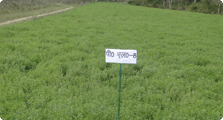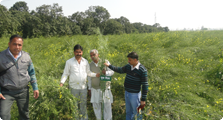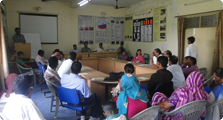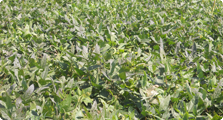Impact of Trainings
Practicing Farmers :
A total of 630 trainings have been imparted for practicing farmers of Haridwar in which 14758 farmers benefited. The trainings have been conducted on crop production, Plant Protection, Horticulture, Livestock Production and Management, Home Science/Women empowerment, Agriculture Engineering, Mushroom etc. The impact of training has also been analyzed time to time which shows that technical skills of the farmers has increased considerably. The technological advancement discussed and taught during trainings are being implemented by the majority of the farmers in their fields. In order to strengthen training programmes at KVK, Haridwar we have prepared several Posters, Photographs, Pumphlets, Technical bulletins and CDs of success story. Besides we have got Rs.5.67 lacs from ATMA for modernization of training infrastructure at KVK. Due to impact of trainings more than 1800 farmers have been benefited directly in terms of getting higher productivity of their crops and livestock. The trainings conducted on backyard poultry farming have helped the farmers for establishment of poultry units of CARI, Davendra and CARI, Dhanraja breeds. According to an estimate more than 36 large/small units have been established in three blocks of Haridwar. To make the farmers more sensitize towards agricultural advancement, special emphasis is being given on under various projects of KVK.
Vocational Trainings :
of rural youth have also been organized at KVK in commercially important areas of agriculture. A total of 27 trainings have been imparted in which 381 youths have participated. Most of the training of rural youth were related to skill development in Potato Chips making, Agarbatti , candle making, bakery, fruits and vegetable preservation, stitching, mushroom and poultry farming which have given tremendous impact in the respective area in terms of improving their domestic income and nutritional security.
Training of Extension Functionaries :
is also one of the thrust area of KVK for faster dissemination of technical know how under field conditions. Under this head a total of 42 trainings have been carried out including sponsored in which 952 trainees get benefited. In these training almost all the areas of agriculture and horticulture including poultry and mushroom farming have been covered and discussed thoroughly for their capacity building.
Impact of Demonstrations
In oilseed, 189 demonstrations have been conducted in soybean, mustard, toria and groundnut on high yielding varieties, nutrient and weed management in 56.15 ha area. The varieties such as PS-1241 of soybean, Advanta-432 (Hyola) of mustard, PT-303 in toria and Kaushal in groundnut introduced in the demonstrations have significantly improved the productivity and farmers have got remunerative return from their oilseed crops. Weed is one of the serious issues in groundnut because it is grown in kharif season hence some herbicides have been demonstrated especially Pendamethalin @ 1.0 kg ai/ha which controlled the weed infestation effectively. In nutrient management sulphur was applied @ 40kg/ha and gave good result in increasing the yield.
In pulses lentil, blackgram and piegion pea are important crop grown in Haridwar but farmers were hardly getting 6-8 q /ha yield from these crops. In these, 144 demonstrations of high yielding varieties like Pant Lentil-4, Pant Urd-35, Pant Urd-30, Pant Urd-31, UPAS-120, Puas 992 were introduced in lentil, blackgram and piegion pea, respectively which increased the yield upto 28 %. The demonstrations were conducted in 45.0 ha area. In pigeon pea most of the farmers used to grow UPAS-120 which takes long time and fetch poor yield thus we have demonstrated PUSA 992 which matures 20 days earlier than UPAS-120 and gives higher yield as a result farmers utilize the same land for timely wheat sowing.
Rice is a principal crop occupied maximum area under agricultural crops. In the recent past some outstanding hybrids and varieties of rice and basmati rice have been released for commercial cultivation by public and private sectors. Accordingly Pant Dhan -12, Pant Sugandhha -15, Arize 6444, Narendra Dhan 359, PRH-10, Pusa 1121 and 1460 have been demonstrated and found highly effectively in terms of getting higher yield. The performance of these varieties has forced to the farmers towards their horizontal expansion. A Total of 179 demonstrations have been conducted in 70.10 ha area.
Wheat is one of the important crop next to rice in Haridwar. The studies laid out by KVK in various parts of Haridwar revealed that varietals replacement in this crop was poor. Keeping in view the outstanding performance some wheat varieties like UP 2584, UP 2572, UP 2565, PBW 502, PBW 550, DBW 17 in some other parts of the country and at KVK during screening trials, these were introduced in demonstrations which reflected their dominance over local and conventional varieties in respect of higher yield. Considering the threat of weeds in wheat cultivation, sulfo-sulfuron was applied and found most effective as compared to other herbicides recommended for weed management in wheat cultivation. A Total of 225 demonstrations have been conducted in 68 ha area.
Chilli, tomato, cabbage, cauliflower, okra , cucumber and brinjal are commercially important grown widely in Haridwar. Hence efforts have been made in demonstrations of some high yielding hybrids namely Sonal and Sarika in okra,Malini and improved Noori in cucumber, Anamika, Chaya and Pragati in brinjal Varun and Alisha in cabbage, Sarita, Snow crown and Madhuri in cauliflower, Divya Jyoti, Indu and Dushehra in chilli under Horticulture Technology Mission and KVK activities. It is also observed that consumption of chemical pesticide is higher in vegetable crops which cause imbalance in ecosystem and residue in the produce. Accordingly some importent pesticides namely indoxacarb, spinosad, thiomethoxam, imidacloprid, thiophenate methyl, difenconazol have been introduced against economically important pests and diseases in vegetable crops. Judicious use of these pesticides is also being promoted through sensitization.
Mango and Litchi are commercially grown fruit crops in Haridwar but most of the growers do not get optimum yield due menace of biotic stresses. In mango incidence of hopper, powdery mildew, shoot gall psylla and fruit fly is prevalent in Haridwar which cause considerable damage to mango crop.Keeping in view the importance of mango crop and damage caused by various pests and diseases some newly introduce chemical molecules viz, thiomethoxam, imidacloprid, thiophenate methyl, baleyton have been introduced and found very promising in IPM programme. In litchi fruit borer,leaf curl mite and algal rust are the major constants in achieving expected yield.
In backyasrd poultry farming, we have introduced CARI Devendra and CARI Dhanraja in Haridwar district which have been developed from Central Avian Research Institute, Bareilly. A total of 36 units have been established so far in various parts of Haridwar district. The farmers who are involved in poultry farming are getting about 30 per cent higher income from the local breeds. The CARI Devendra and CARI Dhanraja are ideal for dual purpose poultry farming.
The demonstrations conducted on perennial fodder crop i.e. hybrid napier to strengthening of quality fodder for dairy animals to enhance the milk production in Dehradun district in about 3.50 ha area.
The demonstrations conducted on Nutrition gardens revealed that farmers are getting fresh vegetables for their consumption without use of chemical fertilizers and pesticides. About 152 demonstrations have been conducted so far in various parts of Haridwar district which convinced the farmers towards nutrition gardens. The impacts of demonstrations conducted on nutrition gardens have received tremodous response from the farmers families.





